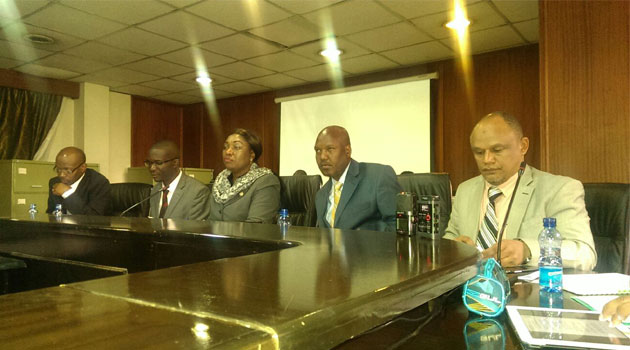
The proposals were made during a meeting with the Independent Electoral and Boundaries Commission where they submitted their amendments to the electoral law/JANE GOIN
The Justice and Legal Affairs committee chaired by Ainabkoi MP Samuel Chepkong’a said one year would be appropriate as already, labour laws require one to issue a three-month notice before resigning which when added to the six months required by the electoral body translates to nine months, a period the committee rounded off to one year.
“It means that you if you want to resign, you will need nine months, which is almost a year, I suggest that you leave it at one year. If there is anyone with a different view, let us meet on the Floor of the House,” said Chepkong’a.
The proposals were made during a meeting with the Independent Electoral and Boundaries Commission where they submitted their amendments to the electoral law.
IEBC had initially proposed that public officers exit public office six months before declaring interest in elective posts but according to the Vice chairperson Lilian Mahiri-Zaja consultations were still ongoing to determine the time frame.
“The law has been that for general elections, the initial provision was seven months, it is now our proposal that we reduce that to six months because that is still adequate time for a public officer to disengage himself through resigning, retiring or any other way of ceasing to hold public office,” said Mahiri-Zaja.
And when the members noted the commission’s reluctance to accept their proposal, they questioned whether the commissioners had personal interests; but the commissioners dismissed the notion saying they would deliberate the matter further.
“The proposal from the committee is that we allow for one year. And you know law making is the preserve of Parliament and members have given their view, so as long as we are safeguarding the mischief that was meant to be cured, we are okay,” Mahiri-Zaja added.
During the meeting, the committee also proposed that IEBC be denied powers to bar a candidate from contesting an election if they were found to have violated the Election Act, however Mahiri-Zaja said this was impossible as their mandate was entrenched in law.
“They would not really take away our powers because our powers are already in the law. It is only clear that all an election court needs to do is to make a report of whether there has been a violation of the Election Act and when there is a determination, then due process must follow,” she said.
Last week IEBC Chairman Issack Hassan also proposed to the committee a change in electoral law that would require MPs to hold a degree from a recognised university in order to contest in the 2017 General Election and the same for Members of the County Assemblies in the 2022 Election.
And while MPs were hesitant to disclose why they were keen on setting the period at one year, pundits say, this is a strategy to ensure those seeking re-election can gauge their opponents in advance.
The capping will also ensure public servants do not also use their offices to campaign ‘silently’.
Several other amendments to the electoral law have been proposed ahead of the 2017 General Election with the National Assembly already considering a Bill by Ugenya MP David Ochieng’ that seeks to change the election date from August to December.
Hassan, who made his position known on the proposal, said such a change would require a referendum as it would extend President Uhuru Kenyatta’s term in office.
The Speaker of the National Assembly Justin Muturi has yet to rule on the matter.
Ahead of the election Muturi has also proposed an amendment to the IEBC Act to reduce the numbers of electoral commissioners from nine to three saying the other six were an unnecessary burden to the taxpayer.









































